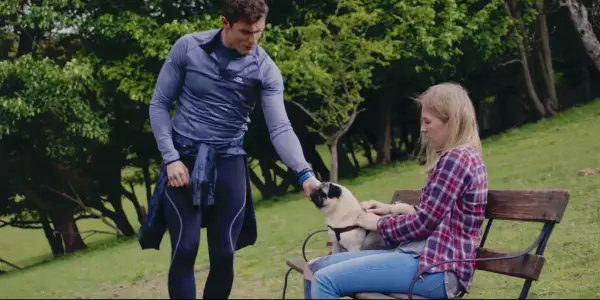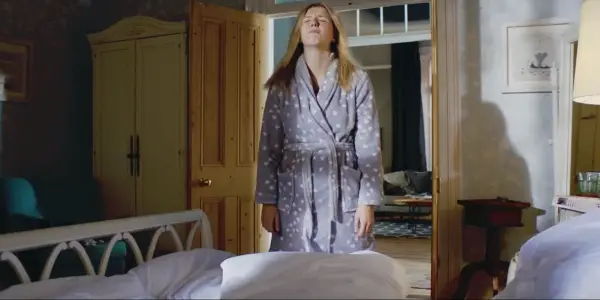PATRICK: A Twee Rom-Com With No Reason To Exist

Zoe Crombie is a Film Studies student from Lancaster University,…
I love dogs. This isn’t much of a statement, nor is it an unusual personality trait, but I do really love dogs. I follow several on Instagram, I stop people in the street to ask to pet their dogs sometimes, and one day I would really like to own one myself. However, this does not mean that I will automatically love any film that features a dog, as the creators of British romcom Patrick seem to have assumed. I fit the exact target audience for this film – female, British, likes dogs – and yet it was totally unrelatable on almost every level, one of the worst sins that a romcom can commit.
Premise
Quirky, Bridget Jones copy Sarah inherits a spoiled pug named Patrick from her deceased grandmother, who quickly begins to mess up almost every aspect of her life in some way. Unfortunately, though, hilarity does not ensue, and the majority of the time that Patrick has caused problems, it usually comes down to the protagonist. He’s ruined your pillows? Move them out of his way! He’s eaten the rubbish? Take it out earlier! He’s being rowdy? Don’t leave him alone all day and refuse to walk him! For anyone who has ever had to look after a dog, some of the moments are understandable, but Sarah’s subsequent reaction rarely is, and because these conflicts are so easily solved, the film ends up devoid of conflict.

The remainder of the drama comes from Sarah’s professional and romantic life: which guy will she end up with, and will she keep her job as a Year 11 English teacher? The answers to both of these questions become painfully obvious as soon as the first act of the movie is over, and while this isn’t a film that you would expect to provide much tension, some is required to keep the viewer invested. Instead, it relies on Patrick to keep the film afloat, but frankly, I’d rather go on YouTube and watch dog compilation videos than watch Patrick again.
The Grand Recent History Of British Rom-Coms
British romantic comedies of the 2000s are arguably regarded as some of the most iconic today, Bridget Jones’ Diary being the first that comes to mind. Helmed by Sharon Maguire and written by Richard Curtis, the film still stands as one of the most relatable romcoms of recent years, and it also isn’t hampered by a desire to appeal to as many people as possible: Bridget smokes, drinks, and swears liberally. Patrick, however, is trying so hard not to put anybody off that it completely loses any kind of connection to real human emotion, and situations that could have felt honest instead feel more like layered clichés.

Wasted Talent
If nothing else, Patrick boasts an impressive cast, featuring Jennifer Saunders, Ed Skrein, and Adrian Scarborough amongst others. Unfortunately, screenwriter and director Mandie Fletcher isn’t able to utilize any of them to their full potential, often falling back on easy gags that could have been used for any actor rather than tailoring the jokes more specifically to their personas. For instance, Saunders plays a food technology teacher that eats cake, and is overweight. That is the joke, and she has very little to do outside of this.
Likewise, Scarborough plays an uptight headteacher, and although he does get a few laughs in, there really isn’t much for him to work with in this role compared to his minor spots in Gavin and Stacey, and even Miranda. Beattie Edmondson, the daughter of Saunders and Ade Edmondson, makes her film debut here as Sarah, and though she does a decent job with the material she was given, her acting is more reminiscent of a sitcom performance, and I do still doubt that anything other than nepotism played a role in her getting the part.
Tory Tweeness
I think especially in these uncertain times for the UK, I have increasingly less of a tolerance for movies that affectionately depict a quirky upper-middle class as they go about their business. From the very start of the film, which shows the apparently jobless Sarah wallowing in her modern, spacious London flat, any level of relatability for 90% of the public is immediately removed.

The largest issues that Sarah faces are created entirely by the character’s own incompetence and brattiness, and the problems that aren’t end up feeling tough to sympathize with because of how absurdly minor they are: her sister can be mean sometimes! Her date didn’t pay for her at the restaurant! The headteacher is old-fashioned! Oh, whatever shall she do. Essentially, this film is two hours of the worst kind of first world problems with no kind of self-awareness, and a posh veneer of Tory quirkiness that is particularly hard to enjoy in the midst of a political disaster.
Conclusion: Patrick
Honestly, Patrick is probably best summarised by the breed of dog it chose as its mascot. It takes a currently successful formula and twists it into an unbearably cutesy mess, created for shallow monetary gain from an indifferent public, and cursed to suffer and peter out earlier than its contemporaries. In short, it never should have existed to begin with.
What did you think of Patrick? Were you won over by the pug, or was the whole ordeal too sugary for you? Let me know in the comments!
Patrick was released in the UK on 29 June 2018.
Does content like this matter to you?
Become a Member and support film journalism. Unlock access to all of Film Inquiry`s great articles. Join a community of like-minded readers who are passionate about cinema - get access to our private members Network, give back to independent filmmakers, and more.
Zoe Crombie is a Film Studies student from Lancaster University, who has been writing for Film Inquiry since May 2018 as well as at her own site Obsess Reviews. She is a big fan of Studio Ghibli and The Marx Brothers, but is willing to watch anything and everything.













